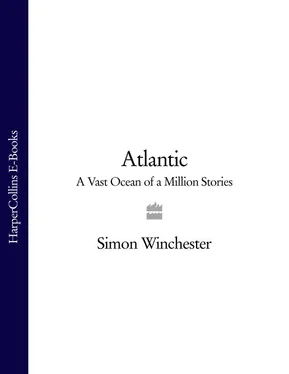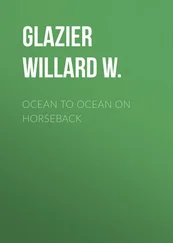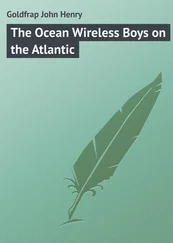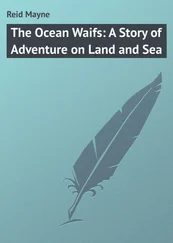Maybe time and schoolboy memory have distorted things a little, but I like to fancy that the clerk who took my savings, in frock coat and pince-nez and wearing a company badge embossed with pine trees, polar bears, and beavers, had written out the ticket in longhand, dipping his pen into an inkwell and blotting it with a roller of pink paper. Liverpool to Montreal, Voyage No. 11 5, it had read, and I clearly do remember spending many subsequent moments turning this precious talisman over and over, examining the engravings, the intaglio, the watermarks. It came in a scarlet and white cardboard wallet, thick and stiff and with a pocket to hold luggage tags with waxed string ties, NOT WANTED ON VOYAGE stickers, immigration forms and customs guides, and vague suggestions as to the coming maritime routine — “11 A.M.: Bouillon on the Boat Deck” was the one that stuck most firmly in my mind.
I think I developed a rather unhealthy attachment to this ticket, freighted as it was with so much symbolism — freedom, the New World, adventure, the Atlantic Ocean — and when I handed it in at the top of the gangplank that spring afternoon and saw how the purser took it with only a studied casualness, I must have looked dismayed, for he smiled and handed it back to me. “First time?” he asked, in a kindly way. “Keep it, then. This is a very grand ocean — and you’re on a White Empress crossing her. Nothing finer! You should keep your first souvenir of going across.”
By sailing time a watery sun had appeared and was lowering itself towards the horizon. All ashore who’s going ashore! came the familiar announcement, on cue. The Tannoy speaker carried the call to “ease springs” (sailor-speak for “let go the ropes”); there was shouting from shore, the crackling of radios on the bridgewing and the foredeck — and one by one the heavy iron-bound nooses of the hawsers splashed into the oily gap between hull and pier, the oily gap began to widen, and the dripping ropes were hauled in slowly by capstans that growled at the strain. A pair of well-worn tugs appeared, yelping and snorting, nosing us out into the tidestream, and then turning us, nudging our bows to the northwest.
The famous George clock on the Royal Liver Building struck five. I could see my father down on the quayside checking his wristwatch. He and my mother pointed upward in relief — they had found me at last, among the crowds of passengers lining the taffrail — and as they waved there came the three departure blasts from our steam-horn, echoing and re-echoing along the ship-crowded waterfront. Our decks started to vibrate and rumble as the engines engaged and the propellers began to thrash the waters astern.
I checked my own watch: it was nine minutes past the hour, the moment when the voyage officially got under way. The tugs let go. The Empress of Britain was at last under her own power, free of her hawsers and bollards and tugs, free of the shore and free of England, beginning to steam firmly and unstoppably away, bound for the deep ocean and the promise of tomorrow. Some of the passengers, emigrants to Canada probably, looked briefly distraught, waving through tears. I was excited, apprehensive, nervous. I watched my parents as they started to walk back to our tiny tan Ford Prefect, their heads bowed.
Darkness began to fall swiftly, and soon the lights of Liverpool and Birkenhead became a loom of orange, like a damped-down fire astern. At the famous floating lighthouse known as the Bar Light Vessel, somewhere off Crosby, the pilot boat came alongside, and a middle-aged man in a brown pullover and a stained white cap stepped nimbly down onto its afterdeck: he waved up at us, and if he mouthed something like “Take care! Have a good crossing!” his words were whipped away by the breeze. Within the hour he and his wife, I thought, would be dozing in front of his television set, the cat asleep by the fire.
We spooled up the engines once he had cleared our wake, and soon the turbines were pushing us along at a good clip, twenty knots, maybe more, and what little rain was left stung the face like needles. Soon we were positively hissing over the sea, ignoring the waves from a storm that, to judge by that last glimpse of the sunset, was now dying away. I stayed on the foredeck to watch for other vessels: there was a bustle of Fleetwood trawlers scuttling home, an inbound freighter or two, and then the outline of what looked like a warship of some sort, maybe a destroyer heading north with us, but faster and quite silent.
Ocean Passages for the World, the long-haul mariners’ route-planning bible, seems frequently eccentric in its suggestions for scheming a voyage. A map will show the obvious: Montreal is some eight degrees of latitude south of Liverpool, and one would think the best way for a ship to travel to the Canadian city from Merseyside would be to turn southward past the coast of Wales, head down through the St. George’s Channel, and, keeping Cork and the light on Fastnet Rock 1well off to starboard, enter the Atlantic on a direct heading for the St. Lawrence estuary. But the blue-backed bible says otherwise: vessels headed from Liverpool to Canadian ports in springtime, as we were, would find it much more navigationally prudent to make a heading not to the south of Ireland but to the north of it, and only after clearing the coast of Donegal near Bloody Foreland make a very much longer southward swoop for Canada. “Although heavy weather is frequently experienced,” Ocean Passages offers in its very detailed advice for sailing vessels, “the winds are generally more favourable and the currents from the Arctic assist in the latter part of the voyage.”
We were a large, very modern, steel-hulled, and well-found power vessel, with the strength to ignore such bagatelles as winds and storms and currents from the Arctic. Our schedule called for us to pick up additional passengers and freight from Greenock, on the Clyde - and so that evening we headed not south but north out of the Mersey into the Irish Sea. Around midnight we saw the flash of the light off the Calf of Man, and later still, spotted a flurry of lights on Galloway on our starboard side and the forbidding basalt cliffs of County Antrim to port.
As dawn came up - and it was raining and blowing again -we were passing Ailsa Craig, a tiny islet made of a fine-grained granite from which are fashioned the world’s best stones for use in the wintertime sport of curling. We passed to the east of the Isle of Arran — there was still late snow on the summit of Goat Fell — and by eleven, the promised bouillon time (though none was on offer that day), we were moored off Greenock. A flotilla of small craft brought out the scattering of passengers - two were children with measles, and there was some slight quarantine-related delay until our captain, an evidently compassionate man named Thorburn, decided to take them — and by lunchtime we were back on our way, making down the Clyde for the sea. As we emerged back into salt water, we altered our heading to starboard and set a westerly course to steer safely around the notoriously rough waters north of Rathlin Island.
Now, and at last, we were making steadily for the open ocean, and as we did so the Atlantic swells began steadily and dramatically to increase. Great rollers began to buffet the bows, big thudding monster waves driven by the springtime westerly gales that blew ceaselessly at the approaches to the British Isles.
Dinner, to no one’s surprise given the pitching of the ship, was a thinly attended affair. Those few of us about on that rain-soaked evening could see the tiny island of Inishtrahull through the scudding clouds, three miles off to port, and between it and us the tiny archipelago of the Tor Rocks, Ireland’s northernmost possessions. Inishtrahull — the Island of the Empty Beach - marks one of the beginnings, or one of the ends, of a North Atlantic crossing. Through glasses we could see dimly a scattering of ruined houses and untidy lines of old stone walls, and then the slender pencil of its famous lighthouse, already winking through the gathering gloom, and which has been flashing its welcomes and farewells to thousands of transatlantic vessels for almost two centuries.
Читать дальше












